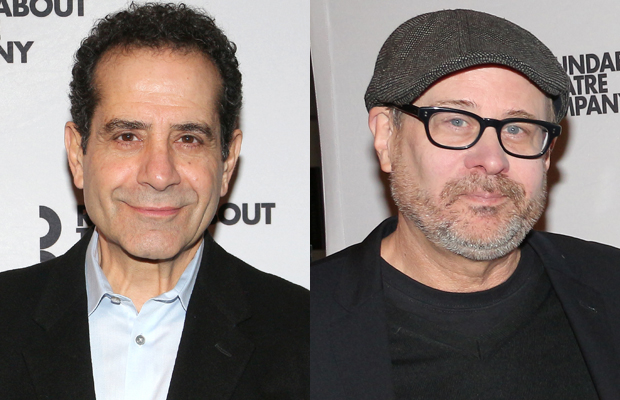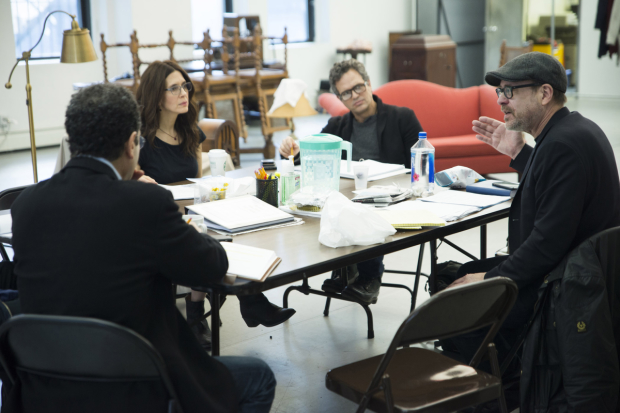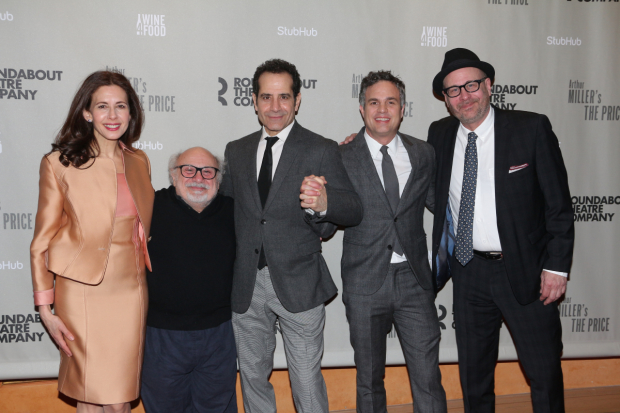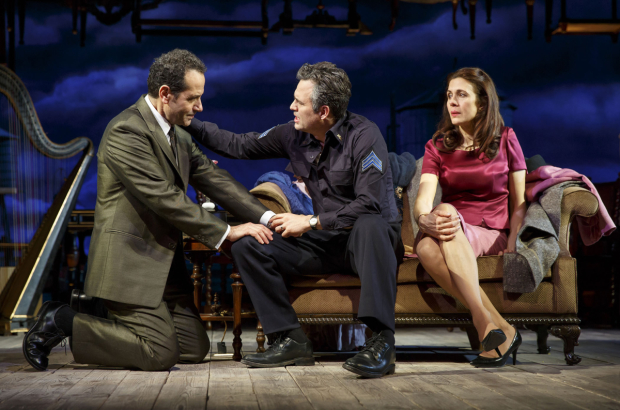Tony Shalhoub and Terry Kinney on the Elusiveness of Truth in The Price
Arthur Miller's The Price, which premiered on Broadway in 1968, follows estranged brothers Victor Franz (Mark Ruffalo) and Walter Franz (Tony Shalhoub) as they reunite to sell off their dead parents' estate. But according to director Terry Kinney, there's much more to Miller's tale than meets the eye. "Everybody at that time was writing plays about the Vietnam War," says Kinney, "and this is Miller's play about the Vietnam War, without ever mentioning Vietnam."
It's those subtleties and nuances of this Miller work that have kept Kinney interested for decades. "I liked it in high school," he says of discovering the play. "I read The Price while we were studying Death of a Salesman. I liked this play better. I felt it was more intimate."
Though Kinney has had this production on his mind ever since that fateful English class, he says the final product, currently onstage at Broadway's American Airlines Theatre, is like nothing he could ever have predicted. For one thing, he would never have anticipated a cast so packed with esteemed actors — Danny DeVito and Jessica Hecht, in addition to Ruffalo and Shalhoub.
Before a recent performance, Kinney and Shalhoub talked about what it’s been like searching for the bottom of one of Miller's deepest plays.
This interview has been condensed and edited for clarity.

(© David Gordon)
Terry, do you think the way you direct the play now is different from the way you would have directed it five years ago or 20 years ago?
Terry: Getting this cast changed everything for me. All bets were off, all my preconceptions, all of it. In the room, we found a new play. So it was dangerous and it was scary.
Tony: It was…I have to say reading it and seeing it when I was younger, it was very hard to relate to it — I was maybe in my late 20s or mid-20s. Being the age we are now, it's just more easy to plug into it because you're looking back on things, you're thinking about choices you've made, there's a lot of loss — parents, friends — and I just have a brand-new appreciation for it now.

(© Jenny Anderson)
Do these people and the way they interact ring true for you?
Tony: I think it's incredibly realistic, but at the same time it's heightened because it's so compressed. I mean we're doing it in real time, yet the ideas, the concepts, the struggles, the arguments are all just squeezed into this very small time frame. In real life, if there is such a thing, these conflicts and resolutions or lack of resolutions might play out over the course of six months or two years. We are just jamming it into a jar. It's like being in a pressure cooker. A pressure cooker with laughs.
Terry: One of the things Miller was really interested in about the theater in the late '60s was, he saw this avant-garde theater and it was all dealing with prototypes and everyone symbolized something but nobody had a past. So this was a response to that. The thing that he was so interested in maintaining from that avant-garde theater that he admired so much was the dream state. And I really feel he was successful with that, and I feel if you really listen to it and watch it, it evokes so much more than the realistic situation going on. We wanted to evoke not just what is there but all the stuff underneath it.

(© David Gordon)
What do you find most impressive about what Miller accomplishes with this play?
Tony: It ultimately is a play about truth, and the genius is that he is not saying that there is such a thing as a fixed, absolute truth. What he was exploring and delving into was this notion of "What is truth?" "Whose truth is more true?"
Terry: And he's also positing that, as a country, if we cannot acknowledge what our actual past entailed, then we are going to keep doing it over and over. It's going to be circular. We are not going to learn our lessons. That's why everybody leaves the play unresolved. But the hopeful thing about the end of this play is that everybody says their side of it. It says, quite hopefully, in the stage direction, "Esther leaves with her life." Now that's something that wasn't true at the beginning of the play. She didn't have her life. So I think that's true for all of them.
Tony: It's like they're saying the unsayable, the things that all of their lives they haven't been able to broach or face or they finally f*cking just, "I'm gonna say it."
Those rehearsals must have been overwhelming.
Terry: I always said about Walter that he harbors guilt in order to mask shame, and Victor harbors this sort of martyrdom to mask a feeling of failure. So it's hard when they're making their point because they're all holding this other truth that they can't face themselves. And so we always said in rehearsal, "How do we do that?" And I always said, "Just forward motion, that's all we have." Just like in life, that's what we do. That's how we deal with it. We go blindly forth.

(© Joan Marcus)










